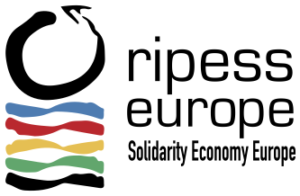What is the Solidarity Economy?
Solidarity economy initiatives are all working towards building a just and sustainable world.
The solidarity economy is made up of lots of different types of activity: informal meetings, grassroots organisations, and local community groups, through to legally-recognised businesses, associations and networks of organisations.
These initiatives look different depending on the places and contexts in which they exist. They’ve been created to meet a need within their community, or broader society, that isn’t being met by our mainstream economy, or because those needs are being met in unethical or unsustainable ways. This is because our dominant economic system puts the creation of profit above all else, and often neglects the real needs of people and our planet.
Solidarity economy initiatives exist in all sectors of the economy – production, distribution and exchange, consumption, finance, and governance. Examples include many types of co-operatives, particularly worker co-ops; unpaid care activities like informal childcare circles, or neighbourhood initiatives that support people experiencing loneliness; swap shops; urban growing projects; local food-related initiatives; credit unions; some open source and free software initiatives; community land trusts; co-operative and co-housing; alternative currencies like the Bristol Pound; and more.
Solidarity economy initiatives share a set of values. These values play a fundamental role in both the set up and everyday running of the initiatives.
The values are:
Equal decision-making – everyone involved in the initiative is able to meaningfully take part in decision-making, without one person’s opinion or status having more weight than anyone else’s. This is often referred to as ‘participatory democracy’ and can be put into practice in different ways, depending on each initiative’s ownership structure.
Equity – the initiative actively opposes all forms of oppression*, both in society and in the initiative itself. Everyone within the initiative is able to play an active part in it, regardless of their race, class, gender, or any other part of their identity.
Sustainability – initiatives do not see nature as something for humans to own and exploit, and strive to be part of creating sustainable alternatives to our extractive and harmful economy.
Pluralism – initiatives respect that there are different ways of meeting our needs depending on the situation in which we operate and that there isn’t a single ‘right’ way to create a just and sustainable world.
Solidarity – the initiative actively upholds, supports and promotes co-operation, sharing, reciprocity, altruism, love and caring over individualism, competitiveness, and division. It seeks to act in solidarity with initiatives and movements that are working towards the same goal.
Solidarity economy initiatives have an important relationship with social movements that focus on similar values, like feminism, anti-racism, and environmental movements, for example. Social movements like these call out the inequalities in our society, and encourage us to resist them, while solidarity economy initiatives focus on creating alternatives and building an economy that serves everyone.
*Forms of oppression include imperialism & colonization; racial, ethnic, religious, class, LGBTQ+, and cultural discrimination; and patriarchy.


